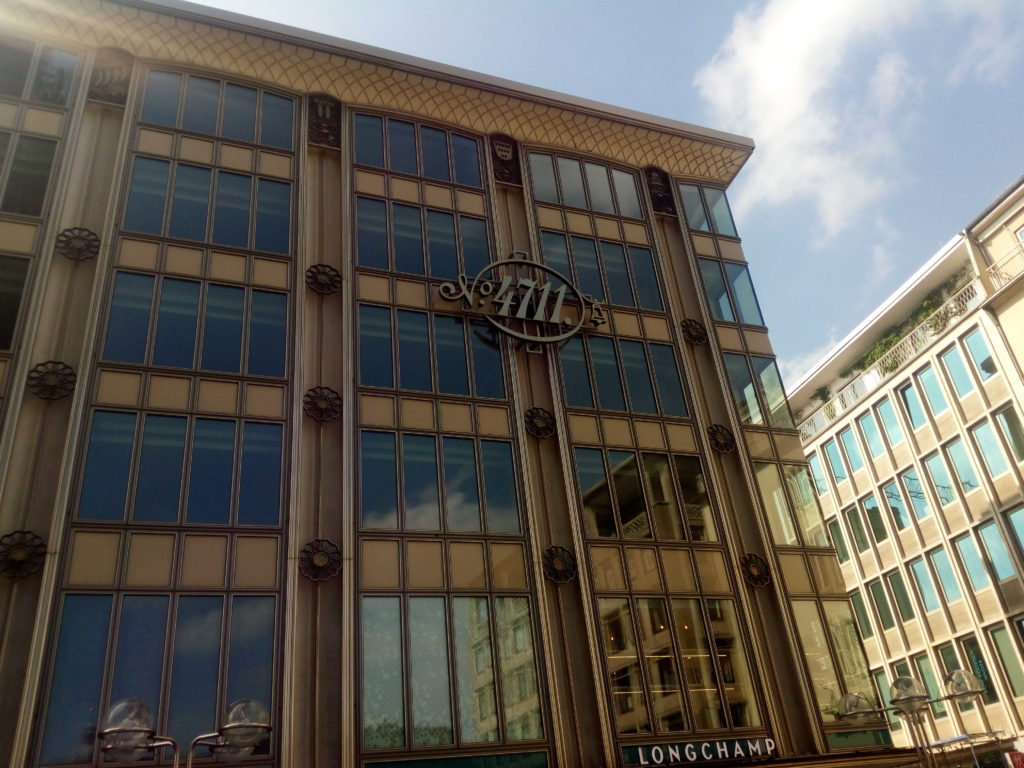Memory lanes: The smell of childhood and lemons in Cologne
Rows and rows of the now iconic 4711 bottles arranged in the display window of Cologne's famous ‘House of Fragrances' were a trip down memory lane for Christian Nielsen.

Monday 24 June 2019
Winter mornings, the smell of burnt toast and something else… a woody, citrus mist of ‘miracle water'. It all came flooding back as I stumbled across 4711's freshly renovated store in Cologne.
It turns out I am very susceptible to this kind of smelly flashback, or ‘olfactory memory' as it is called. I usually struggle to trace the origins of these latent memories, but not this time… It was right before me in meticulous stacks of shining aqua-blue and gold.
Until visiting the city in Germany's northern Rhine region, I had assumed 4711 was the only eau de Cologne producer in the city. Wrong. The best marketed brand, yes, but definitely not the first. The original recipe for ‘Cologne Water' was developed nearly a century earlier by the Italian Giovanni (later Johann) Maria Farina.
“It gives me great refreshment, strengthens my senses and imagination,” the inventor wrote to his brother not long before opening the perfumery that started it all in 1709. Tucked into the shadows of the famous Gothic Cathedral, Farina House and its Fragrance Museum on Obenmarspforten is regarded as a must-see by the city's 3.7 million annual visitors, drawn to what Cologne Tourism describes as “three centuries of scent and cultural history”.
Napoleon's decree
Venerable as the Farina House may be, I was more drawn to the iconography of 4711 and its unmistakable sensory ties to youth and life in the 1970s. And it certainly got me wondering about the origins of the name and branding?
Apparently, the moniker dates back to the occupation of Cologne by Napoleon's army who insisted the city's medieval streets be better structured and numbered. (Let's not dwell on the irony of the French instructing the German's to be more orderly!) The Mülhens family property which housed their nascent perfumery on Glockengasse received the number ‘4711'.
The unique hexagonal bottle, designed by Peter Heinrich Molanus, was introduced later, in 1820. It wasn't until 1875 that the 4711 brand was officially registered alongside an early version of the logo. The aqua-blue bottle and gilded lettering so instantly recognised around the world today was finalised some 25 years later.
The 4711 Echt Kölnisch Wasser, or Original Cologne Water, actually started as a ‘remedy' splashed over the skin or consumed as a tonic until Napoleon decreed that these sorts of ‘medicaments' must state their ingredients. The Mülhens stopped selling 4711 as a curative altogether to avoid having to reveal their secret recipe.
Marketed as a fragrance only, several characteristic changes were made to the brand. Innovations in packaging and transportation and the discovery of aldehydes – oxidising alcohol to form organic compounds – spurred growth in ‘exotic' new fragrances, helping to make 4711 a truly global and resilient brand, as it turns out.
The perfumery has survived some tough times, not least the destruction of its main store and factory during WWII bombing raids on Cologne, which left some 90% of the city in ruins. The business has also changed hands a couple of times and is now owned by Maurer & Wirtz based in Aachen, an hour's drive to the south-west.
The flagship store underwent major renovation in 2011, which according to reports was aimed at bringing out the “luminescence of the famous Molanus bottle”. The work coincided with the launch on 4 July (or 4/7/11 … Get it!) of a new fragrance called 4711 Nouveau Cologne.
“The original [4711] eau de Cologne is now over two centuries old – there must be a secret that keeps people coming back for hundreds of years,” challenges The Small Flower blog. “The brand chalks this success up to high-quality ingredients and essential oils. The bright, fresh top note grabs attention right away – you can't help but notice it from the first spray or splash.”
Indeed, the memory of that first morning mist stays with you forever. But it sometimes takes a stroll down memory lanes in Cologne to bring it all back.


